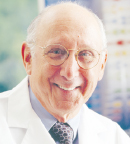
Cara Haymaker, PhD
CARA HAYMAKER, PhD, of MD Anderson Cancer Center, said the researchers have made a “crucial” discovery: adoptive cellular therapy can be expanded beyond academic centers and be “taken to the masses.” Tumor-infiltrating lymphocytes can now be manufactured and shipped to patients treated at centers without manufacturing capabilities. “This is going to open up this therapy robustly and hopefully extend it to other cancer types,” she said. The findings validate work at MD Anderson, in which Dr. Haymaker has been involved, showing similar response rates in previously treated patients.
It will be important to understand why complete responses are so much more common in treatment-naive patients. “It might be the impact on tumor-infiltrating lymphocytes themselves because of all the therapies the patient has been exposed to…. The T cells may just be exhausted and need to be revitalized,” she suggested, such as by engineering the tumor-infiltrating lymphocytes to be more immunogenic. ■
DISCLOSURE: Dr. Haymaker has participated in studies that receive research funding from Nektar, Idera, and Iovance Biotherapeutics.


